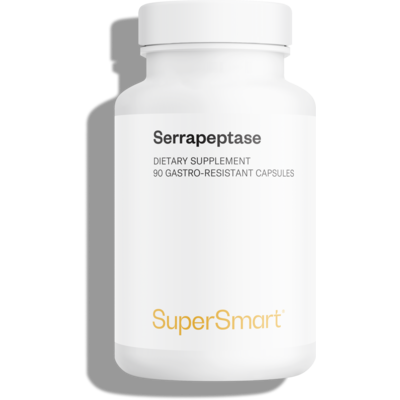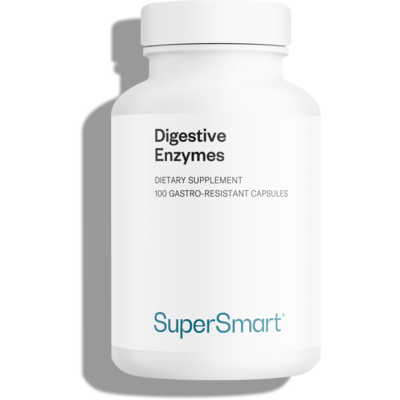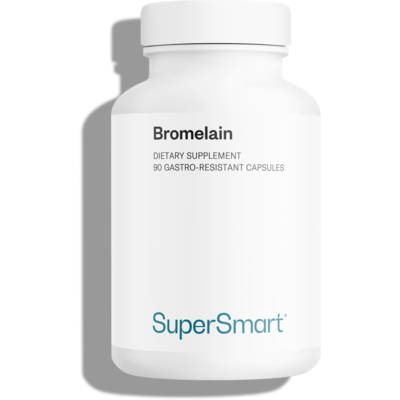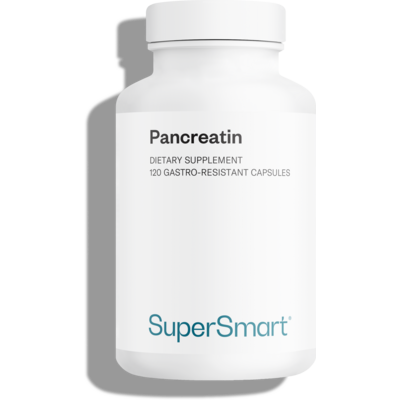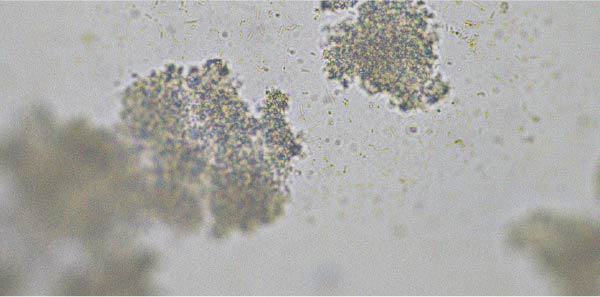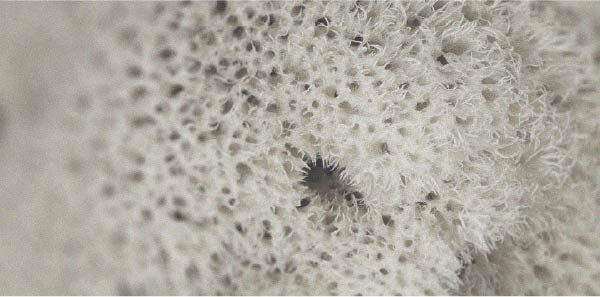Digestive enzymes: what are they and why should you take them?
Digestive enzymes play a key role in ensuring our digestion operates smoothly. Discover all their biological functions and how important they are for nutrient absorption.

What is a digestive enzyme?
A digestive enzyme is a substance naturally secreted by the body which supports and accelerates - ’catalyzes’ - the chemical reactions governing digestion. Its main function is to break down the large molecules (polymers) that make up food into smaller ones (monomers) so that absorbable nutrients can be released at the site of the intestinal villi (1).
Digestive enzymes are produced by various organs and glands throughout the gastrointestinal tract. They are primarily secreted in the mouth, stomach and smallintestine (2). In medical terminology, they are identified by their -ase suffix (or less commonly, -ine).
Importantly, each digestive enzyme has a unique binding site which allows only one type of substrate to be identified, accepted and broken down, like a key in a lock. This albeit-simplified analogy illustrates the specific and selective character of enzymatic activity (3). A protease, for example, can only break down proteins.
Different categories of digestive enzymes
Proteases: for breaking down proteins
As a reminder, proteins are made up of polypeptide chains, which are themselves comprised of amino acid building blocks. The role of proteases (or proteolytic enzymes) is to split all the polypeptide bonds in order to extract the amino acids, the only parts able to cross the intestinal barrier .... (4).
Protein digestion begins in the stomach with the activation of inactivated enzymes called pepsinogens into pepsin under the effects of hydrochloric acid (5). This active enzyme splits the proteins into polypeptides.
This is followed by the secretion in pancreatic juice of two inactive proenzymes, trypsinogen and chymotrypsinogen. Once in the duodenum (the first part of the small intestine), these are converted by enterokinase into their active forms, trypsin and chymotrypsin.
It is these enzymes, part of the peptidase family, which go on to break the polypeptides into chains of three (tripeptides) or two (dipeptides) amino acids (6-7). Their work continues at the surface of enterocytes, where the amino acids are finally isolated.
Lipases: for breaking down lipids
As their name suggests, lipases (lipolytic enzymes) act by breaking down lipids into fatty acids (8).
When they arrive in the duodenum, fats are first emulsified with bile salts from vesicles. This first stage facilitates the task of the major lipid breakdown enzyme, pancreatic lipase (9). Produced by the pancreas, this converts lipids into fatty acids and glycerol. As with proteins, this conversion concludes at the enterocytes.
These fatty acids then enter the lymphatic system packaged into chylomicrons, before later arriving in the bloodstream (10).
Glycosidases: for breaking down carbohydrates
Carbohydrate digestion involves a wide variety of enzymes as they have to be able to adapt to the diversity and complexity of the sugars we consume. Their ultimate goal is to reduce these down to three simple sugars (-oses) that can be absorbed by the body: glucose, fructose and galactose (11).
For complex sugars (polysaccharides) such as the starch in carbohydrates, the first step takes place ... in the mouth! Saliva contains amylase, an enzyme which triggers the cleaving of polysaccharides into maltose and dextrins (12). Operating at a slightly acid pH (around 6.8), salivary amylase stops acting once it reaches the stomach where it is broken down by gastric juices.
This breaking down of carbohydrates continues courtesy of the pancreas and pancreatic amylase. Its function is twofold: to process polysaccharides that may have escaped the salivary amylase, and to cleave the dextrins into the disaccharides (double sugars) maltose and isomaltose (13).
Disaccharides, whether from food or the breakdown of polysaccharides, are finally separated into -oses, as a result of specific enzymes expressed on the surface of enterocytes:
- maltose into glucose + glucose by maltase (14);
- isomaltose into glucose + glucose by isomaltase (15);
- sucrose into glucose + fructose by sucrase (16);
- lactose into glucose + galactose by lactase (17).
Can you supplement with digestive enzymes?
In certain circumstances, there may be a decline in the body’s digestive enzyme production. In addition to diseases affecting the gastrointestinal tract, factors related to age, heredity or gut flora imbalances may play a part (18-19).
This primarily manifests in digestive discomfort and even weight loss due to inadequate nutrient absorption. In such cases, it makes sense to give the body a helping hand by supplementing with digestive enzymes (20).
As well as the essential proteases, lipases and amylases, cutting-edge enzyme supplements also contain enzymes not produced by the body which are used in processing sensitive foods. One such enzyme is cellulase responsible for breaking down cellulose (the main fibre in plants) (21).
In addition, the effects of digestive enzymes can be maximised by combining them with certain phytonutrients that benefit digestive health. These include green aniseed for reducing flatulence and bloating (22), peppermint for its antispasmodic and carminative effects (23), and fenugreek which plays a role in carbohydrate and lipid metabolism (24). The synergistic supplement Digestive Enzymes combines, in a single capsule, 15 important digestive enzymes, including lactase, several proteases and cellulase, as well as all the plant extracts mentioned above.
LE CONSEIL SuperSmart
References
- Pandol SJ. The Exocrine Pancreas. San Rafael (CA): Morgan & Claypool Life Sciences; 2010. Digestive Enzymes. Available from: https://www.ncbi.nlm.nih.gov/books/NBK54127/
- Patricia JJ, Dhamoon AS. Physiology, Digestion. [Updated 2022 Sep 12]. In: StatPearls [Internet]. Treasure Island (FL): StatPearls Publishing; 2022 Jan-. Available from: https://www.ncbi.nlm.nih.gov/books/NBK544242/
- Robinson PK. Enzymes: principles and biotechnological applications. Essays Biochem. 2015;59:1-41. doi: 10.1042/bse0590001. Erratum in: Essays Biochem. 2015;59:75. PMID: 26504249; PMCID: PMC4692135.
- López-Otín C, Bond JS. Proteases: multifunctional enzymes in life and disease. J Biol Chem. 2008 Nov 7;283(45):30433-7. doi: 10.1074/jbc.R800035200. Epub 2008 Jul 23. PMID: 18650443; PMCID: PMC2576539.
- Heda R, Toro F, Tombazzi CR. Physiology, Pepsin. [Updated 2022 May 8]. In: StatPearls [Internet]. Treasure Island (FL): StatPearls Publishing; 2022 Jan-. Available from: https://www.ncbi.nlm.nih.gov/books/NBK537005/
- Fu Z, Akula S, Thorpe M, Hellman L. Marked difference in efficiency of the digestive enzymes pepsin, trypsin, chymotrypsin, and pancreatic elastase to cleave tightly folded proteins. Biol Chem. 2021 May 12;402(7):861-867. doi: 10.1515/hsz-2020-0386. PMID: 33977684.
- Walmsley SJ, Rudnick PA, Liang Y, Dong Q, Stein SE, Nesvizhskii AI. Comprehensive analysis of protein digestion using six trypsins reveals the origin of trypsin as a significant source of variability in proteomics. J Proteome Res. 2013 Dec 6;12(12):5666-80. doi: 10.1021/pr400611h. Epub 2013 Nov 14. PMID: 24116745; PMCID: PMC4076643.
- Pirahanchi Y, Sharma S. Biochemistry, Lipase. [Updated 2022 Jul 11]. In: StatPearls [Internet]. Treasure Island (FL): StatPearls Publishing; 2022 Jan-. Available from: https://www.ncbi.nlm.nih.gov/books/NBK537346/
- Zhu G, Fang Q, Zhu F, Huang D, Yang C. Structure and Function of Pancreatic Lipase-Related Protein 2 and Its Relationship With Pathological States. Front Genet. 2021 Jul 5;12:693538. doi: 10.3389/fgene.2021.693538. PMID: 34290745; PMCID: PMC8287333.
- Escobedo N, Oliver G. The Lymphatic Vasculature: Its Role in Adipose Metabolism and Obesity. Cell Metab. 2017 Oct 3;26(4):598-609. doi: 10.1016/j.cmet.2017.07.020. Epub 2017 Aug 24. PMID: 28844882; PMCID: PMC5629116.
- Qi X, Tester RF. Fructose, galactose and glucose - In health and disease. Clin Nutr ESPEN. 2019 Oct;33:18-28. doi: 10.1016/j.clnesp.2019.07.004. Epub 2019 Jul 19. PMID: 31451258.
- Peyrot des Gachons C, Breslin PA. Salivary Amylase: Digestion and Metabolic Syndrome. Curr Diab Rep. 2016 Oct;16(10):102. doi: 10.1007/s11892-016-0794-7. PMID: 27640169; PMCID: PMC6825871.
- Date K, Satoh A, Iida K, Ogawa H. Pancreatic α-Amylase Controls Glucose Assimilation by Duodenal Retrieval through N-Glycan-specific Binding, Endocytosis, and Degradation. J Biol Chem. 2015 Jul 10;290(28):17439-50. doi: 10.1074/jbc.M114.594937. Epub 2015 May 28. PMID: 26023238; PMCID: PMC4498079.
- Nawaz MA, Pervez S, Jamal M, Jan T, Khan W, Rauf A, Aman A, Qader SAU. Maltose deterioration approach: Catalytic behavior optimization and stability profile of maltase from Bacillus licheniformis KIBGE-IB4. Biotechnol Rep (Amst). 2019 Nov 12;24:e00400. doi: 10.1016/j.btre.2019.e00400. PMID: 31799147; PMCID: PMC6881636.
- Gericke B, Schecker N, Amiri M, Naim HY. Structure-function analysis of human sucrase-isomaltase identifies key residues required for catalytic activity. J Biol Chem. 2017 Jun 30;292(26):11070-11078. doi: 10.1074/jbc.M117.791939. Epub 2017 May 18. PMID: 28522605; PMCID: PMC5491789.
- Gericke B, Schecker N, Amiri M, Naim HY. Structure-function analysis of human sucrase-isomaltase identifies key residues required for catalytic activity. J Biol Chem. 2017 Jun 30;292(26):11070-11078. doi: 10.1074/jbc.M117.791939. Epub 2017 May 18. PMID: 28522605; PMCID: PMC5491789.
- Forsgård RA. Lactose digestion in humans: intestinal lactase appears to be constitutive whereas the colonic microbiome is adaptable. Am J Clin Nutr. 2019 Aug 1;110(2):273-279. doi: 10.1093/ajcn/nqz104. PMID: 31175813; PMCID: PMC6669050.
- Ghodeif AO, Azer SA. Pancreatic Insufficiency. [Updated 2022 May 1]. In: StatPearls [Internet]. Treasure Island (FL): StatPearls Publishing; 2022 Jan-. Available from: https://www.ncbi.nlm.nih.gov/books/NBK555926/
- Swagerty DL Jr, Walling AD, Klein RM. Lactose intolerance. Am Fam Physician. 2002 May 1;65(9):1845-50. Erratum in: Am Fam Physician. 2003 Mar 15;67(6):1195. PMID: 12018807.
- Ianiro G, Pecere S, Giorgio V, Gasbarrini A, Cammarota G. Digestive Enzyme Supplementation in Gastrointestinal Diseases. Curr Drug Metab. 2016;17(2):187-93. doi: 10.2174/138920021702160114150137. PMID: 26806042; PMCID: PMC4923703.
- Kim IH, Choi JW, Lee MK, Kwon CJ, Nam TJ. Anti-obesity effects of pectinase and cellulase enzyme‑treated Ecklonia cava extract in high‑fat diet‑fed C57BL/6N mice. Int J Mol Med. 2018 Feb;41(2):924-934. doi: 10.3892/ijmm.2017.3295. Epub 2017 Nov 28. PMID: 29207025; PMCID: PMC5752156.
- Shojaii A, Abdollahi Fard M. Review of Pharmacological Properties and Chemical Constituents of Pimpinella anisum. ISRN Pharm. 2012;2012:510795. doi: 10.5402/2012/510795. Epub 2012 Jul 16. PMID: 22848853; PMCID: PMC3405664.
- Chumpitazi BP, Kearns GL, Shulman RJ. Review article: the physiological effects and safety of peppermint oil and its efficacy in irritable bowel syndrome and other functional disorders. Aliment Pharmacol Ther. 2018 Mar;47(6):738-752. doi: 10.1111/apt.14519. Epub 2018 Jan 26. PMID: 29372567; PMCID: PMC5814329.
- Bruce-Keller AJ, Richard AJ, Fernandez-Kim SO, Ribnicky DM, Salbaum JM, Newman S, Carmouche R, Stephens JM. Fenugreek Counters the Effects of High Fat Diet on Gut Microbiota in Mice: Links to Metabolic Benefit. Sci Rep. 2020 Jan 27;10(1):1245. doi: 10.1038/s41598-020-58005-7. PMID: 31988303; PMCID: PMC6985225.
1 Days
repeat customer
recommended by my doctor. easy to create an account. Discounts and specials are appreciated. packaging and delivery is dependable. Capsules easy to digest. I've had some some capsules and tablets that are broken inside their bottles.
Kokee
6 Days
Order was shipped on time and packaged…Wonderful Jobs!
Order was shipped on time and packaged excellently.
DMHoge
12 Days
great products and prices
great products and prices
Marie
18 Days
Easy to navigate site
Easy to navigate site, had what I was searching for, good price. easy order-check out
James Tucker
24 Days
My skin is clearing up nicely!
Pretty good for my skin so far.
Christian
26 Days
The new packaging is excellent
The new packaging is excellent - finally! No more squashed boxes and torn envelopes.
GORAN
27 Days
Great Product
Great Product
Larry Garrett
31 Days
Quick shipping
Quick shipping; good price. No issues!
Mary McCarty
33 Days
Thr product is very good and is helping…
Thr product is very good and is helping me on my health. Then is always on time
LUGO Luz
35 Days
Buying was fine
Buying was fine. I had problems with the website not recognizing my login info, and had to call to get it fixed. Other than that, everything was good.
David S. Clark
35 Days
Your super maca and super ginseng are…phenomenal
Your super maca and super ginseng are phenomenal supplements that compliment each other when taking them together. Fantastic feeling of well-being and lots of mid day energy without the crash.
Keith Mason
38 Days
I have had amazing results with every…
I have had amazing results with every supplement I've purchased. I am extremely satisfied with this company
kirstin Torres
38 Days
Fine products
Fine products . They are on the leading edge of online supplements. The only issue -so far-is they sometime run out of subscription items.
Jason Argos
41 Days
The ordering process is very user…
The ordering process is very user friendly and the products always come in a timely manner.
CARTER Rhonda
42 Days
The price for Dr
The price for Dr. Pero's AC-11 is reasonable and in line with his views. (my former colleague). Keep it pure.
CAMPBELL Clayton


